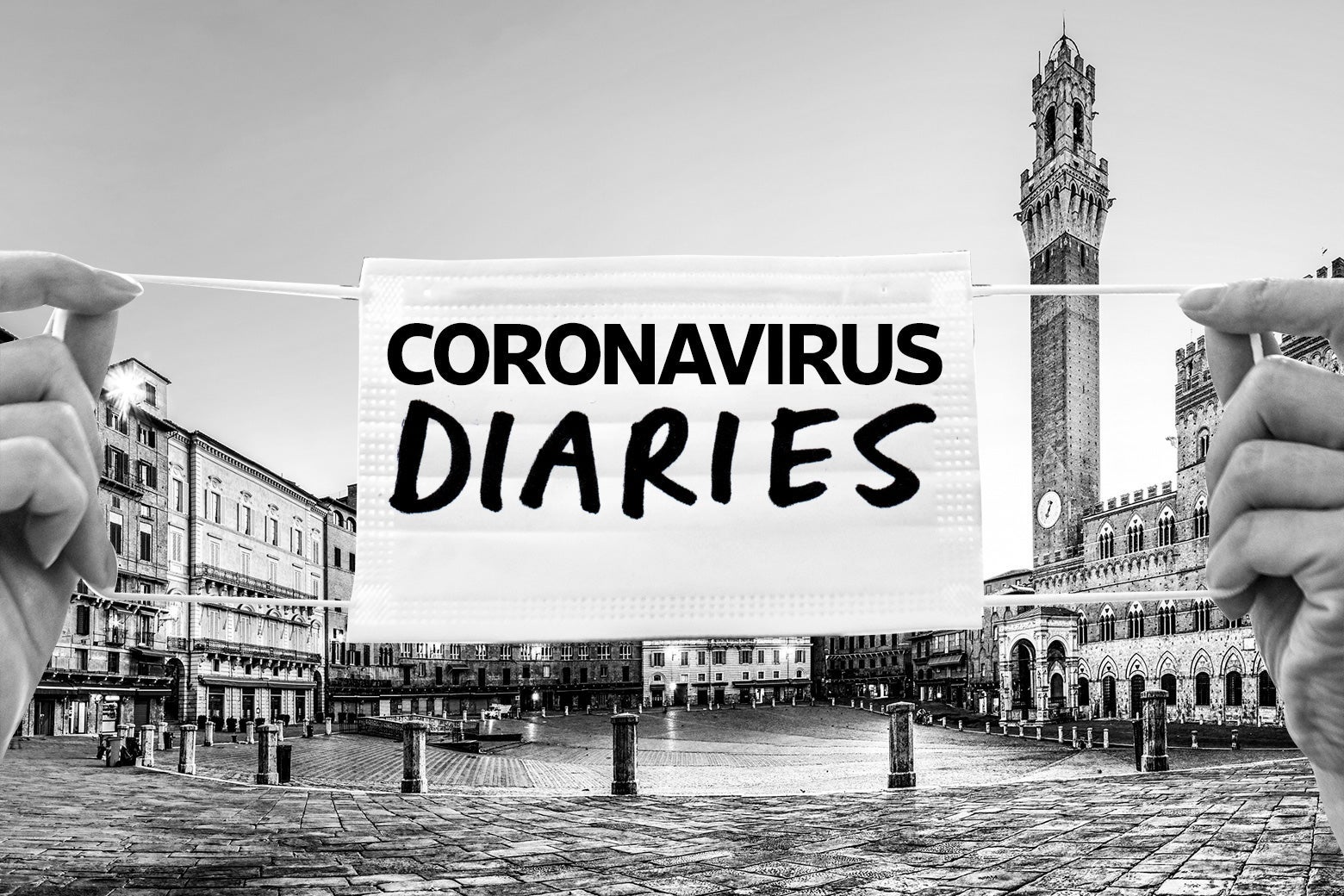Coronavirus Diaries is a series of dispatches exploring how the coronavirus is affecting people’s lives. For the latest public health information, please refer to the Centers for Disease Control and Prevention’s website. For Slate’s coronavirus coverage, click here.
MILAN—Three weeks ago, before the COVID-19 breakdown shook Italians’ lives and economy, the “common good” was just a philosophical concept that I tried to keep in mind every once in a while—inside a voting booth, at a rally, etc. But since Friday, Feb. 21, the idea of the “common good” has become the centerpiece of my days, all of which have been distorted by this invisible force. The coronavirus has made us all put the good of society before our individual needs; only if we all respect the rules will we be able to defeat it, we are told. In recent weeks the epidemic has grown inexorably, every day the number of infected people marks another jump, the current death toll is at 631, and it is not yet clear when it will reach its peak. The people that are affected are mainly elderly, but adults and young adults are not spared.
Exasperated by the rapid growth of infection and the lack of respect for some important rules, on the evening of Monday, March 9, Italian Prime Minister Giuseppe Conte announced a nationwide lockdown, under which people will only be allowed to leave their homes for specific reasons. A draconian decision, sure, but one made for the common good. Until a few days ago, there were still many, too many, people who walked undisturbed on the streets, meeting for an evening aperitivo, shopping at the mall. I don’t think this was just the legendary Italian tendency to ignore the rules, because I’ve seen the photos of more than 3,500 French people getting together to break the world record for most people dressed as Smurfs (why?), even though doing so was forbidden. Instead I believe that on one hand, the blame for these irresponsible behaviors can be attributed to a few politicians who have tried to downplay the emergency, asking us to stay calm without giving proper weight to the recommendations of doctors who have always been clear on the seriousness of the situation. On the other hand, the problem may be that we are fortunate enough to live in a democracy, and laws must take all citizens’ rights into account, even in situations like this. The “Wuhan model” was definitely successful on one front: The extremely harsh containment measures that punished those who broke them worked in limiting spread, and now infections are on the decline in China. But China is a regime. Here, we focus on our own civic sense. Are Italians, French, Europeans, or Americans ready to show how strong their civic sense is, when it means giving up their personal freedoms?
For nearly four days, I have not even gone outside of my own yard; I have not seen my parents, which for an Italian is quite strange; and I find myself looking at the world from my kitchen window. Having neither a vaccine nor medicine, the only weapon is extreme isolation. And so my family and I have completely isolated ourselves. I spoke to some doctors from Milan and northern Italy. They are tired, destroyed, and working nonstop on the front lines to fight death by COVID-19. The hospitals have been converted; routine operations are no longer available, only emergencies. Intensive care units have been doubled by transforming operating rooms, but anesthesiologists say that beds are running out and they have already had to make some very difficult decisions, just like in war. “If I only have one bed available and two patients, one 42 years old in good health and one 86 years old with three pathologies, I am forced to give precedence to he who will have more chances of living,” one doctor told me. A very difficult decision to make ethically, but really the only one possible. So as not to force them to make these choices, we must stay at home.
This surreal time reminds me a little of my grandmother’s tales, those of the Second World War. There was no going out for fear of bombs; now there’s no going out for fear of the contagion. They had a curfew; now everything closes at 6 p.m. They waited anxiously for news on the radio; we are always connected, waiting for the next update. We all count the dead. But they came from the First World War, from hunger and fatigue. We have been living in peace for 75 years. We aren’t familiar with adversity at this scale. Our hearts and souls haven’t been trained for it. We grew up with the luck of wellness, we cannot let go of the idea that everything is calculable, and everything is predictable. This cursed virus has come to remind us of our own fragility.
A few days ago, an American friend asked me if someone I knew had contracted COVID-19. No, I didn’t know anyone. Until two days ago, when I did. Today, I know three. The more the days go by, the more the numbers grow, the more the circle tightens. When I talk to my friends abroad, I only have one piece of advice: Keep your guard up.
